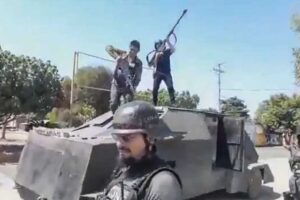How world's bloodiest cartels are pimping up Mad Max-style monster trucks with machine gun turrets to rule cocaine trail | The Sun

BRUTAL Mexican drug cartels are pimping ordinary pick-ups and transforming them into Mad Max-style ‘Franken-tanks’.
Underground workshops are churning out hundreds of the post-apocalyptic looking battle wagons as the narcos' ultra violence ratchets up.
Drug lords equip the monster trucks with battering rams, four-inch-thick steel plates and turrets for machine guns to take on law enforcement and rival mobs.
Known by Mexican law enforcement as narco-tanks, rhino trucks or simply monstruos – meaning monster – they are often painted in camouflage patterns and emblazoned with the cartel’s initials.
The trucks are the latest additions to the cartels' high tech arsenals unleashing bloody mayhem on the cocaine trail.
South American narcos have even produced submarines capable of crossing the Atlantic.
READ MORE WORLD NEWS
My wife was a millionaire & hid a scandalous secret… I was blamed for her murder
Cops’ lies got me wrongly jailed for 16 YEARS over murder of girl in school loo
Security analyst Romain Le Cour told the New York Times of the narco-tanks: “The monsters are the way to send the message, ‘I’m in charge, and I want everyone to see I’m in charge’.”
The senior expert at the Switzerland-based Global Initiative against Transnational Organized Crime added: “These are commando-style groups looking to replicate special forces in how they’re armed, how they’re trained, how they look.”
The cartels like to show off their homemade tanks on TikTok and other social media with rap or folk songs bragging about the gang’s bloodthirsty exploits.
The narco-tanks – pioneered by the Gulf Cartel and the Zetas syndicate – first emerged around a decade ago.
Most read in The Sun
Sky Sports legend QUITS just hours before Soccer Saturday relaunch
Meghan beams at birthday dinner with Harry after Royals ignore her big day
Catherine Tyldesley's 'Cakegate' scandal takes NEW twist as baker hits back
Heartbreaking details emerge about S Club's Paul's struggles before death at 46
Since then they have become increasingly more sophisticated in both design and weaponry.
Some of the monsters have cockpit-like command seats in the front of the vehicle complete with an array of flashing dashboard lights.
The trucks' armour has portholes where machine guns can be poked out from the interior to fire at enemies. Many also have a hatch similar to a tank.
Security expert Héctor Romero Sánchez revealed that cartels kidnapped mechanics and forced them to work on modifying the monsters at clandestine workshops.
He told Foro TV: "Once the kidnapping is committed, they take them to their workshops. Those workshops can be in different parts of the Mexican Republic.
"If the technicians are lucky they are set free and leave. Unfortunately, when they’re not so lucky they are killed."
Pick-ups to be converted – with Chevrolet Silverados and Ford F-150s the most popular- are often stolen in the US and brought south of the border.
Mexico City ballistics expert Jorge Septién said the rise of the monster trucks was proof the cartels go to any length to “enforce by violent means their dominance against adversary gangs and against authority.’’
Mr Septién told the New York Times: ''It has to do with a status symbol. The first ones we saw were practically blow-torched and welded in a very shoddy way.”
However, the armaments expert says that newer models now ''look like a military vehicle” from a distance.
'Monsters' seized
In June Mexican armed forces destroyed 14 of the home-made armoured vehicles that were seized in the northeastern border state of Tamaulipas.
In photos released by Mexico’s attorney general's office the camouflaged monsters had battering rams and reinforced armour capable of protecting against explosions and bullets.
The Tamaulipas Attorney General’s Office said: “The modifications applied to these vehicles represent a danger to the safety of law enforcement agencies and the community in general.
“Their destruction diminishes the mobility and firepower of these organised criminal groups.”
In the last four years Tamaulipas state police have seized 257 similar Franken-tanks from narcos.
The sheer number of monster trucks seized by the authorities demonstrates the financial muscle of the cartels. It also shows the importance placed on the vehicles in fighting rival drug syndicates.
It's perhaps why the mobsters are keen to show off their homemade weaponry.
In 2020 the Jalisco New Generation Cartel (JNGC) released a chilling video showing their paramilitary-style foot soldiers in front of a snaking queue of camouflaged armoured cars.
It was a blatant and provocative show of force to intimidate rivals and the government’s security personnel.
In December JNGC gangster Antonio Oseguera Cervantes – nicknamed Tony Montana, the lead character in narco hit movie Scarface – was arrested.
Montana was allegedly in charge of logistics – including monster truck production – for the cartel.
His younger brother Nemesio Oseguera Cervantes – known as El Mencho – founded CJNG around 2012. It soon became one of the most feared criminal organisations on Earth.
Other weapons at the disposal of the narco private armies include rocket launchers and rocket-propelled grenades capable of shooting down military helicopters and steel-penetrating Barrett .50 caliber sniper rifles.
Last month four security officials and two civilians were killed with a roadside anti-vehicle mine in Jalisco, western Mexico.
State governor Enrique Alfaro described it as an "act of terror" which “shows what these organised crime groups are capable of".
Despite their sinister appearance, the monster trucks can have their drawbacks when it comes to actual fighting.
Read More on The Sun
Inside Paris Fury’s relatable life – from days out with her 6 kids to B&M trips
EastEnders legend unrecognisable 25 years after shock soap exit
Laden with heavy steel plates, they can be slow and unwieldy, especially in narrow, urban roads. Poor workmanship can also see them malfunctioning.
Security analyst Alexei Chévez, based in Cuernavaca, Mexico, said: “We see them constantly breaking down and being abandoned.”
Source: Read Full Article

















